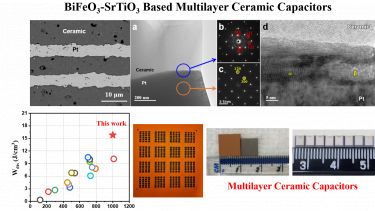∫˘¬´”∞“µ‚Äôs Functional Materials and Devices (FMD) Group has utilised the expertise and equipment of the to develop novel Lead Oxide (PbO)-free high energy density capacitors, which are currently undergoing prototype testing with UK-based multilayer ceramic capacitor (MLCC) manufacturers, with the aim of improving the operating voltage and energy storage density of MLCCs without sacrificing their temperature stability.
More than 10,000 MLCCs are employed in a modern electric car. Whilst most of these are used in the computer electronics which interfaces with the driver, approximately 1-2000 parts are deployed in the engine management system and are required to operate at higher temperatures (200 as opposed to 120oC) and fields (300 instead of 100 kV/cm). These improvements must also be commensurate with an increased energy density (Wrec, J/cm3) so that fewer MLCCs are required to store and deliver the necessary pulsed voltage.
Currently, capacitor manufacturers competing for a market share in EVs utilise materials derived from existing supply chains based on BaTiO3 (BT). However, there are significant issues in developing BT based materials beyond their current limitations, not least of which is their relatively low dielectric breakdown strength. PbO-based materials can achieve the desired energy density but the MLCC market is traditionally PbO-free and legislation in a number of companies restricts the use of PbO containing products in consumer electronics.
Finding less toxic but equally performant PbO-free materials is a major scientific and technological challenge.
UNDERPINNING RESEARCH
This project builds on substantial expertise on thick fim processing, developed in the FMD group at ∫˘¬´”∞“µ over the last 10-15 years. This initiative began as part of the ‚ÄòNew and Improved Materials‚Äô Large Grant (PI West) and has continued to this day.
The FMD Group is the UK academic leader in thick film multilayer technology and these skills are applied to a range of projects developing prototype devices from capacitors, fuel cells, batteries and actuators. This capability has substantially raised the profile of the FMD group, culminating in an invitation to join the in 2015. This work impacts on two key UK MLCC manufacturers ‚Äì and [both of which collaborate with ∫˘¬´”∞“µ] ‚Äì and also on end users in EV production.
ROYCE SUPPORT
Royce’s funding of equipment has enhanced the Department of Materials Science and Engineering’s existing facilities with a new screen printer and an atmosphere controlled glove box/slot die system.
This equipment facilitates greater control over uniformity and thickness, leading to thinner dielectric layers with greater breakdown strength and energy density. In addition, powder preparation has been improved through the purchase of a hydrothermal vessel system and a bespoke biotemplating furnace.
RESULTS/OUTPUTS
The latest breakthrough in the project has resulted in a world-record value of energy storage density and discharge efficiency (18 J·cm-3 and 93%) achieved through control of dielectric breakdown strength (1000 kV·cm-3).
Materials have undergone rigorous testing for frequency dependence (0.01-100 Hz), temperature stability (20-160 oC) and fatigue (1-104), discharge behavior (high power density of 35 MW·cm-3) and discharge time (5 μs).
FUTURE IMPACT
The FMD Group’s unprecedented connections to the wider electronics community through the CDP has meant that dissemination of its breakthough discoveries reach an audience of technical directors and researchers in world leading companies, including amongst many others , , , Shoe Chemicals, and .
Closer to home, the researchers have direct technology transfer on-going with through a and Knowles Capacitors through their membership of the CDP. Some MLCCs have attained production through AVX Ltd whilst others are undergoing factory trials.
COLLABORATORS
Prof. Ian Reaney and Prof. Derek Sinclair lead a team of researchers composed of senior post doctoral researchers and KTP associates, Zhilun Lu, Dawei Wang, Ge Wang, Linhao Li and Ilkan Caisir as well as visiting scholars, PhD, MSc and UG project students.
Directly collaborating companies include, AVX Ltd (KTP 11028) and Knowles Capacitors, both of whom are members of the (CDP), for which Prof. Reaney is the European Site Director and whose wider membership includes MLCC manufacturers and end-users such as: Taiyo Yuden, Murata, Samsung, and Apple.
Our most recent discoveries (highest known energy density for PbO-free MLCCs) were presented to the CDP members in our Bi-annual Conference on May 13/14 2020 which of course was, on this occasion, virtual.

